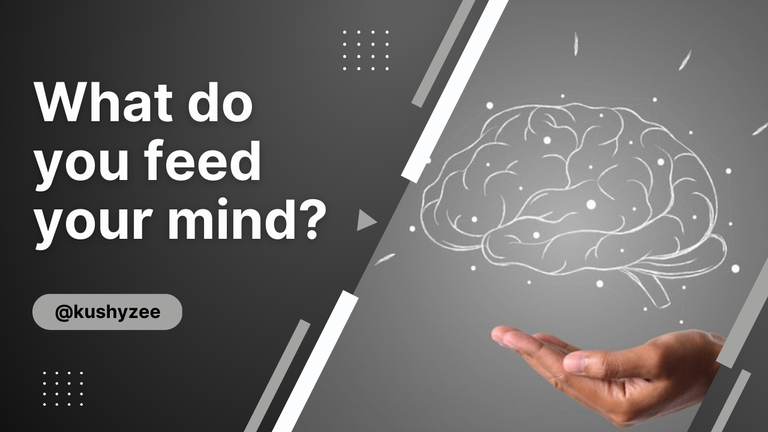What do you feed your mind?

It's easy to think that our behavior is the result of our upbringing, genetics, and the environment that surrounds us. Yet this is only partially true. Your thoughts do have an impact on your personality and behavior after all. It's a little-known fact that what we think about can make a big difference in how we act and feel.
You become what you feed your mind. Every thought that passes through your mind will be a force in shaping your life. You are the product of your thoughts and also the controller of your emotions. It doesn't matter how big or small the thought is, its impact on you will be huge and lasting. What you think is important creates a reality in which you choose to live.
If you've ever wondered why some people are so productive and others are not, it's because they think in different ways. For example, if you believe that success is something that only happens to other people, then when things don't go your way, it will be much harder for you to get motivated. On the other hand, if your mindset is focused on achieving big goals and being successful, then when things don't go your way, it won't affect your motivation too much.

You can't help but notice these days that people are increasingly obsessed with what they think about all the time. It's not just on social media anymore, it's everywhere. You see it in the news, you see it in politics, and even in everyday conversations. It's practically impossible to avoid thinking about yourself or others right now but is this actually a good thing?
It may sound like an obvious question, but if you're like most people out there right now, you probably don't give much thought to it. After all, we've been conditioned to think of self-reflection as something negative: "I'm so vain!" or "I'm so egotistical!" But are these actually true? And if so, how does that affect our behavior?
The answer lies in the way our minds work: we tend to focus on our negative experiences over more positive ones because those negative experiences feel more real than anything else does. This means that when we have a negative experience (e.g., getting rejected by someone), our brains will try to make sense of that experience by incorporating it into the story of our lives.
Our minds are powerful things; they can be used to help us solve problems, or they can be used to cause us harm. We often take our minds for granted because we don't realize how much control we actually have over them. But just like any other muscle, if we want to use our mind effectively, we need to exercise it regularly. The more you think positively, the more positively you will act. The more you think negatively, the more negatively you will act. The more you learn, the more life-long knowledge and skills you gain.

Conclusion
Our beliefs are a bit of a Pandora's box. Opening that box and thinking a certain way can have a profound effect on how you think, and therefore, how you act. I usually don't believe in "silver bullet" solutions to complex problems, but I think the idea of positive self-talk is a good place to start in terms of re-programming your brain.
We don't always have control over what we think about, but we do have plenty of influence over what we feed our minds through books and other reading material, through watching the news and consuming other media, through hobbies and interests. The key is to be mindful of the kinds of information you allow into your mind. And when you can, focus on positive keywords, productive thoughts, and inspirational words.
Thanks for reading

Connect with me on:
Twitter: @kushyzeena
Readcash: @kushyzee
Edited with Canva